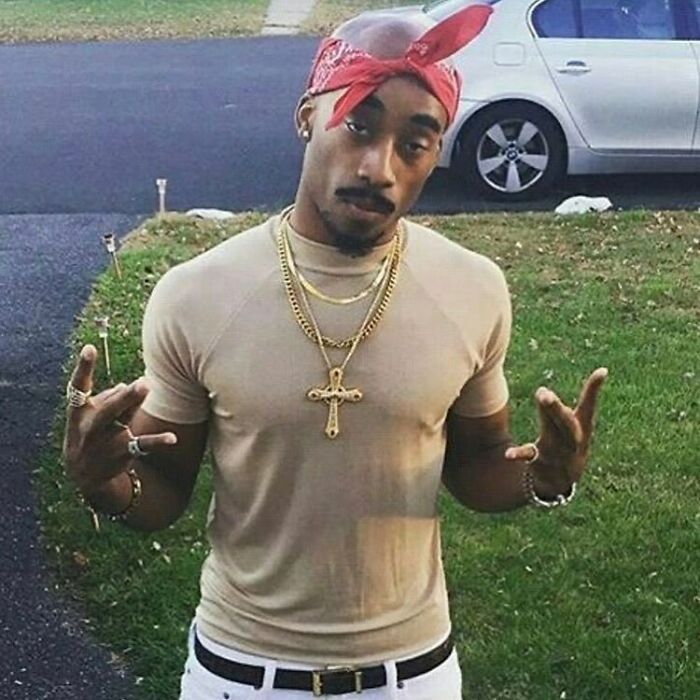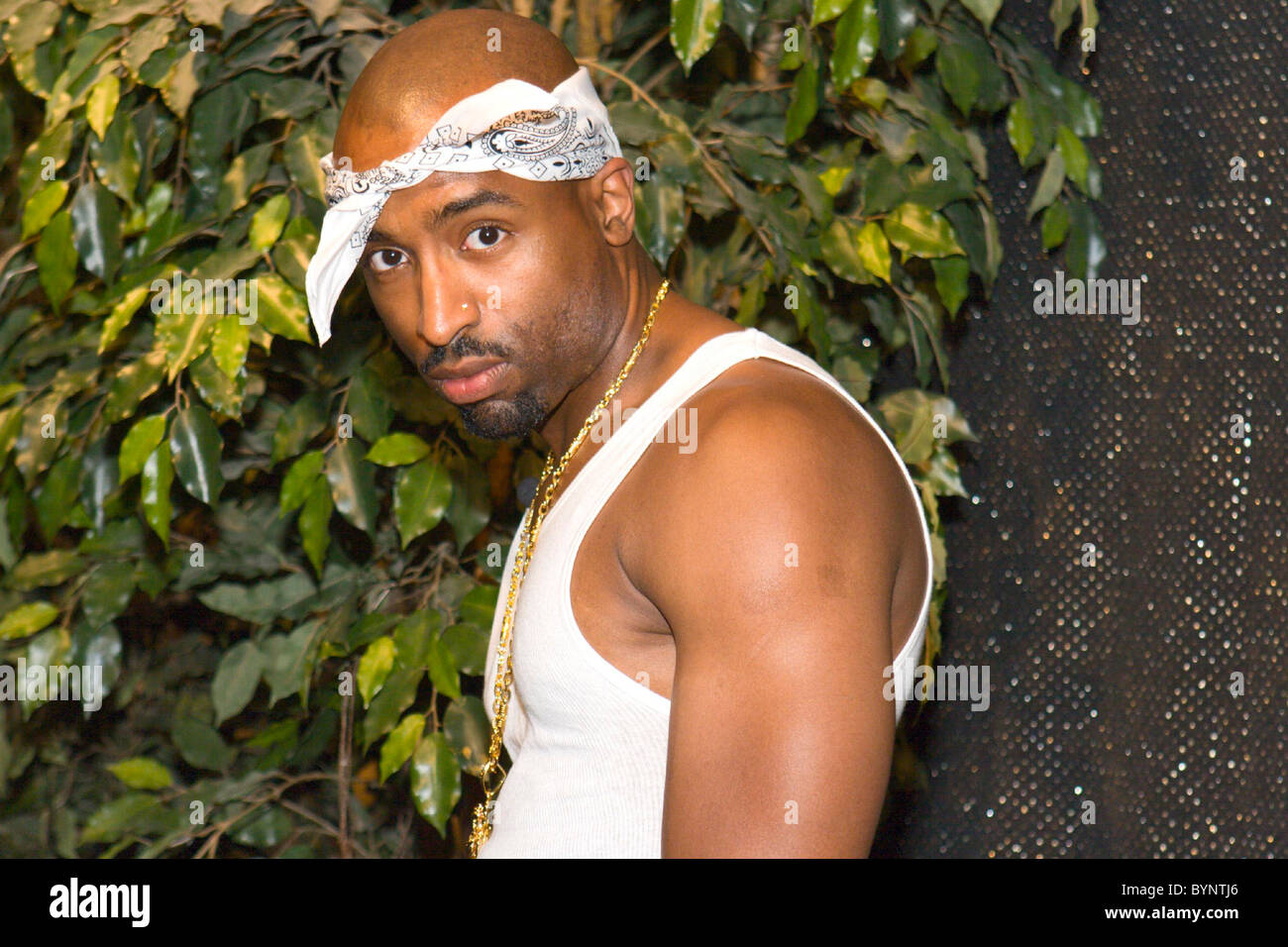When it comes to Tupac Shakur, the name resonates with an indelible mark on music history and pop culture. Known for his raw talent, charisma, and unapologetic voice, Tupac remains one of the most iconic figures in hip-hop. The fascination with "Tupac look alike" has grown over the years, as fans and enthusiasts continue to search for individuals who resemble the late rapper. This article delves into the world of Tupac's legacy, exploring why people are captivated by his image and how it influences modern culture.
Tupac's influence extends far beyond his music. His style, demeanor, and the way he carried himself have become a blueprint for many aspiring artists. The search for a Tupac look alike is not just about physical resemblance but also about embodying the spirit and essence that made him a legend. This fascination is a testament to his enduring impact on society.
In this article, we will explore the phenomenon of Tupac look alikes, the significance of his legacy, and how it continues to inspire new generations. From biographical details to cultural implications, this piece aims to provide a comprehensive look at why Tupac's image remains so powerful today.
Read also:4 Paws Grooming Your Ultimate Guide To Keeping Your Furry Friend In Top Shape
Table of Contents
- Biography of Tupac Shakur
- Physical Resemblance and Its Importance
- Cultural Impact of Tupac's Image
- The Look-Alike Industry
- Fan Perception and Emotional Connection
- Media Representation of Tupac Look Alikes
- Long-Term Effects on Pop Culture
- Business Opportunities for Look Alikes
- Ethical Considerations in Using Tupac's Image
- Conclusion
Biography of Tupac Shakur
Tupac Amaru Shakur, born on June 16, 1971, in East Harlem, New York, was more than just a rapper. He was a poet, actor, and activist whose life and career were marked by both triumphs and turmoil. Below is a brief overview of his life:
Data and Facts About Tupac Shakur
| Full Name | Tupac Amaru Shakur |
|---|---|
| Date of Birth | June 16, 1971 |
| Place of Birth | New York City, USA |
| Death | September 13, 1996 (Las Vegas, Nevada) |
| Occupation | Rapper, Actor, Activist |
Tupac's upbringing was steeped in activism, as his mother, Afeni Shakur, was a member of the Black Panther Party. This background heavily influenced his music and worldview, making him a voice for the marginalized and oppressed.
Physical Resemblance and Its Importance
When discussing a "Tupac look alike," physical resemblance plays a crucial role. Fans and enthusiasts are drawn to individuals who not only resemble Tupac in appearance but also capture his essence. This section explores why physical resemblance matters and how it contributes to the fascination with Tupac.
Key Features of Tupac's Appearance
- Dark complexion
- Short, Afro-inspired hairstyles
- Piercings and tattoos
- A confident, commanding presence
These features are often replicated by those claiming to be Tupac look alikes. The authenticity of their resemblance can vary, but the allure remains strong.
Cultural Impact of Tupac's Image
Tupac's image has transcended the boundaries of music to become a cultural icon. His style, from his clothing choices to his mannerisms, has influenced countless individuals worldwide. The fascination with "Tupac look alike" reflects a deeper cultural connection to his legacy.
How Tupac's Image Influences Modern Culture
Tupac's influence is evident in various aspects of modern culture:
Read also:Nj Parkway Accident Understanding Causes Safety Measures And Prevention
- Fashion trends inspired by his streetwear style
- Hip-hop artists who emulate his vocal delivery and stage presence
- Art and literature that explore themes central to his music
This cultural impact ensures that Tupac's image remains relevant and inspiring to new generations.
The Look-Alike Industry
The phenomenon of "Tupac look alike" has given rise to a thriving industry. Individuals who resemble Tupac are often sought after for events, performances, and media appearances. This section examines the business side of being a Tupac look alike.
Opportunities in the Look-Alike Industry
- Live performances and concerts
- Commercial endorsements and advertisements
- Participation in documentaries and films
While lucrative, this industry also raises questions about authenticity and respect for Tupac's legacy.
Fan Perception and Emotional Connection
Fans of Tupac often form deep emotional connections with his music and image. The idea of a "Tupac look alike" resonates with them on a personal level, evoking memories and nostalgia. This section explores how fans perceive and interact with individuals who resemble Tupac.
Why Fans Connect with Tupac Look Alikes
Fans connect with Tupac look alikes for several reasons:
- Reminders of Tupac's music and messages
- Hope for a continuation of his legacy
- Opportunities to celebrate his life and impact
This emotional connection underscores the importance of Tupac's image in contemporary culture.
Media Representation of Tupac Look Alikes
Media plays a significant role in shaping perceptions of Tupac look alikes. From documentaries to social media platforms, the portrayal of these individuals can either enhance or detract from Tupac's legacy. This section examines how media representation influences public opinion.
Examples of Media Representation
Some notable examples of media representation include:
- Documentaries exploring the lives of Tupac look alikes
- Social media campaigns celebrating his legacy
- News articles discussing the phenomenon
These representations highlight the ongoing fascination with Tupac's image and its cultural significance.
Long-Term Effects on Pop Culture
The phenomenon of "Tupac look alike" has long-term effects on pop culture. As new generations discover Tupac's music and image, the fascination with his likeness continues to grow. This section discusses the lasting impact of Tupac's legacy on modern culture.
Impact on Music and Fashion
Tupac's influence is evident in:
- Emerging artists who cite him as a major inspiration
- Fashion designers incorporating his style into their collections
- Artists and activists using his image to promote social causes
This impact ensures that Tupac's legacy remains vibrant and relevant.
Business Opportunities for Look Alikes
Being a Tupac look alike presents numerous business opportunities. From endorsements to public appearances, individuals who resemble Tupac can leverage their likeness for financial gain. This section explores these opportunities and the challenges they present.
Challenges and Opportunities
Some key opportunities include:
- Collaborations with brands aligned with Tupac's values
- Public speaking engagements and workshops
- Participation in cultural events and festivals
However, challenges such as maintaining authenticity and avoiding exploitation must be carefully navigated.
Ethical Considerations in Using Tupac's Image
Using Tupac's image for commercial purposes raises ethical questions. This section examines the responsibilities of individuals and companies who profit from his likeness, emphasizing the importance of respecting his legacy.
Respecting Tupac's Legacy
To ensure ethical use of Tupac's image:
- Companies should align with his values and causes
- Individuals should seek permission from his estate when necessary
- Efforts should be made to educate others about his contributions
These considerations help preserve the integrity of Tupac's legacy.
Conclusion
The phenomenon of "Tupac look alike" is a testament to the enduring influence of Tupac Shakur. From his music to his image, Tupac's legacy continues to inspire and captivate audiences worldwide. This article has explored various aspects of this fascination, including physical resemblance, cultural impact, and ethical considerations.
We invite you to share your thoughts and experiences in the comments below. Additionally, consider exploring other articles on our site that delve into the world of music and culture. Together, let's celebrate and preserve the legacy of one of hip-hop's greatest icons.


